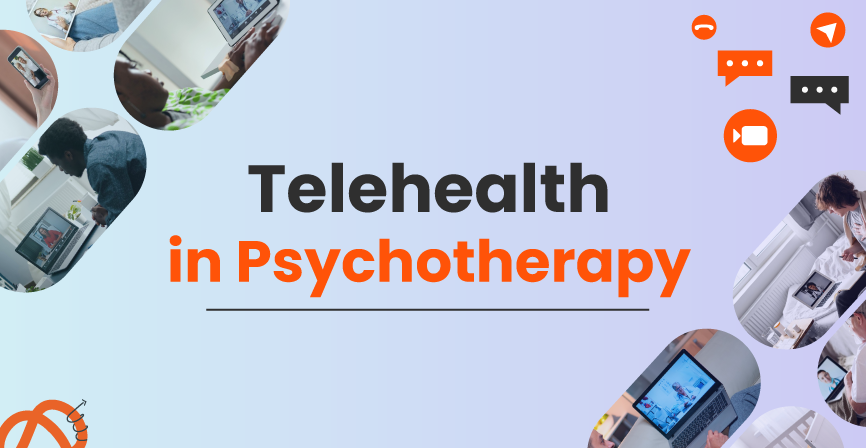When you search the web for “Telehealth,” you’ll find an astounding 155 million results. This sheer volume underscores the growing significance of telehealth in psychotherapy business. It is rapidly becoming a key player in mental health care, with more and more people turning to digital platforms for support.
The reason behind this is its accessibility and convenience, which have turned it into an appealing option for those seeking mental health services, offering the flexibility to connect with therapists from the comfort of home.
In this article, we will answer your questions about:
- The role of telehealth in psychotherapy business, exploring its potential benefits and the challenges it presents.
- Is it truly improving the quality of mental health care, or does it introduce new risks?
- How is it influencing the therapeutic process and the relationships between therapists and clients?
- What strategies can psychotherapy providers use to enhance the integration of online services?
- The overall effectiveness of remote treatment.
Let’s dive into the potential and intricacies of remote psychotherapy.
What Is Telehealth In Psychotherapy and Why Is It Becoming Popular?
It is an online communication between a patient and his care provider using digital platforms. Over the years online services have been going up, especially in the psychotherapy field. And their popularity has risen much more than it ever used to. Some key factors turned virtual therapy into an inevitable solution for both psychotherapy providers and patients, including:
Growth in Technology
Every week, new smartphones, quicker internet, and video conferencing transform many parts of life, especially mental healthcare.
Thanks to better digital platforms, all psychotherapy providers now offer online services. This new communication approach has made therapy more practical and effective. Digital platforms simplify consultations between therapists and patients.
COVID-19 Pandemic
No pride in that, but also no denying that the global COVID-19 pandemic played a significant role in accelerating the adoption of online services.
With lockdowns, social distancing measures, and minimized in-person contact, online therapy has proven to be a timely and essential alternative for psychotherapy providers, offering a safe option for client sessions during the lockdown.
This adaptation not only ensured continuous access to mental health care throughout the pandemic but also demonstrated the long-term viability of telehealth in psychotherapy.
Growing Demand for Psychotherapy
Awareness of mental health issues has eventually led to a higher demand for psychotherapy and therefore online counselors too. A lot of patients find online tools as a less intimidating solution when it comes to seeking help. While some patients prefer traditional face-to-face sessions, others go for online therapy and find it more convenient, particularly for those who are facing barriers to in-person therapy, such as stigma, geographical limitations, and time constraints.
Insurance Covering
New insurance policies have made online therapy easier to access and cheaper for patients. This is a motive for a lot of businesses to integrate virtual conferences in psychotherapy services because they know it will help them have long-term relationships with their clients. As regulation refinancing has allowed healthcare providers to offer virtual therapy services and get reimbursed for them easily.
Enhance Your Business Services with Telehealth in Psychotherapy
When online therapy was first introduced to patients, it was met with many positive reactions, such as the fact that it was more comfortable, and patients would still receive treatment without interruptions.
On the other hand, a lot of providers have found telehealth to be an effective way of delivering care and some even added more online services to their practice, producing higher ranks in maintaining old clients and attracting new ones.
Generally, telehealth in psychotherapy users, including both the patients and therapy providers, have been sharing their positive views regarding remote therapy of high satisfaction with it.
Considering these factors, it has become a key part of psychotherapy providers’ systems worldwide. Over time, this has led to online services playing a larger role in psychotherapy.
Do you think psychotherapists truly benefit from telehealth?
Let’s find out…
Benefits of Telehealth in Psychotherapy
When discussing the role of telehealth in psychotherapy, it’s clear that its impact extends far beyond just a few areas. In the next few minutes, we will focus on the most significant roles that every psychotherapy provider agrees on and how you can leverage them to elevate your therapy practice.
1. Reach your client from the comfort of their couch
In recent years, it has transformed the landscape of psychotherapy, turning the traditional in-office session into a digital experience. This digital aspect made the clients much more reachable to their therapy providers making the whole therapeutic process much easier.
Easier Access to Therapy Sessions
The most important advantage is the increased convenience and accessibility that online services provide. Distance therapy means that no more travel to a doctor’s office is required, making it especially useful for people with mobility problems or hectic schedules.
Through video conferencing, psychotherapists have a wider opportunity for clients. No more waiting in the office for clients to arrive because clients are one click away from meeting them. Thus maximizing the capacity of each therapist which ends up with a higher profit for the business all in all.
Easier Access to Therapy Sessions
According to The American Psychological Association, psychiatrists who adopted telehealth in psychotherapy programs proved higher success rates with their clients. And therefore maintained clients for longer periods. For a lot of people, regular therapy sessions are the type of therapy that helps them cope with their mental health problems.
With that digital shift, therapy can continue seamlessly even during travel or other life changes again maximizing the revenue for businesses and making the best use for clients. This consistency can be vital for patients who rely on regular sessions to manage anxiety, depression, or other mental health challenges.
Maintaining Therapeutic Relationship
Virtual therapy remains effective despite the absence of a therapist’s physical presence. As therapists can still establish and maintain strong relationships with their clients online. By utilizing video conferencing tools, therapists can interact with clients in real-time, ensuring that communication remains effective. Many therapists believe that the digital format opens up new ways of connecting with clients, and they can adapt their methods to suit the virtual environment.

2. Expanding Telehealth in Psychotherapy for Emergency Mental Health Care
Immediate Access to Support
Online therapy services offer a swift response in emergencies, allowing for immediate online consultations with mental health professionals and eliminating the wait for in-person sessions.
This rapid support is crucial for calming crises, from anxiety attacks to severe depression, with help just a call or click away. Additionally, many psychotherapy platforms collaborate with local emergency services, ensuring therapists can direct patients to necessary resources or emergency personnel when needed.
This integration not only provides comprehensive crisis care but also enhances patient outcomes, contributing to the business success of these services.
3. Telehealth modernizes mental health businesses
Online services in psychotherapy are changing how patients experience mental health care and boosting profits for psychotherapy businesses in Canada and in the USA. It overcomes distance barriers, making mental health services available worldwide, especially in areas with few resources. This leads to more success stories and achievements for the business.
Improved access to psychotherapy in rural regions
Online psychiatrists are breaking down location barriers, making mental health services more available globally. They’re enhancing their website’s visibility, increasing mental health awareness, gaining more clients, and having a greater impact.
International Psychiatrists Appointments
To elaborate, international cooperation is essential as it allows therapists from various countries to partner and leverage each other’s expertise. This collaborative approach:
- Ensures a higher standard of care by combining diverse knowledge and techniques.
- Increases the online presence of their services, making them more accessible.
- Builds greater confidence among clients due to a wider endorsement of practices.
- Provides tailored treatment options that respect cultural nuances and needs.
By partnering, psychiatrists expand their client base, enhancing global awareness of their practices and the range of services they provide. This synergy not only enriches the therapeutic landscape but also fosters innovation in psychiatric care.
Breaking the Stigma Around Mental Health Issues
Online psychiatrists who actively work to break the stigma around mental health issues often become the preferred choice for clients. They appreciate the flexibility and responsive approach that these professionals offer, which helps them feel understood and supported.
4. Reaching Underserved Groups with Telehealth in Psychotherapy
It has, therefore, proved to be a very powerful tool in reaching unserved populations who would otherwise be excluded from traditional mental health services. This offers some new opportunities to engage persons who face barriers to accessing care through the use of technology. This also gives the impression that the psychiatry business is more inclusive than it is solely for profit generation.
Overcoming Poor Logistics to Access
Whether it is lack of transportation, low finances, or social stigma, teletherapy resolves this in many ways, from access to care remotely, reducing the travel burden, and offering services at lower costs, yet increasing the overall profit of the business. This approach opens mental health support to people who otherwise wouldn’t receive it.
Overcoming Linguistic and Cultural Barriers
Many of the online platforms are translated into different languages. This means some people live in cities or regions where physically present therapists do not speak the same language or do not completely understand their cultural background and that’s when the online therapy sessions appear as a great solution.
Empowering Individuals
Easy access is directly related to empowerment. Online sessions give more people the opportunity to seek help and pursue therapy, hence achieving better mental health outcomes for both service providers and patients. This becomes especially important for marginalized groups who sometimes have to bear additional challenges while accessing traditional mental health services.
In conclusion, telehealth in psychotherapy is redefining the therapeutic experience. It offers unprecedented greater results for businesses including higher profit, wider reach, and increased website awareness. As well as easier access, and global reach to mental healthcare.
Now, it’s time to get practical.
This is your chance to learn how to make your digital system work in favor of your psychotherapy business. Yes, online therapy has many benefits, but understanding the behind-the-scenes aspects gives you a clear view of its potential.
Did you think about how you reach the right potential client and match them with a suitable online therapist?
Orthoplex will walk you through this and will share its expertise in developing secure and scalable virtual therapy sessions to bring out the best in this virtual experience. With proper knowledge and tools, you will be confident enough to step into the world of digital therapy.
Top 5 tools Orthoplex recommends and implements with for psychotherapy clientele
1. Twilio
Secure Communication through End-to-End Encrypted Messaging
Orthoplex prioritizes client confidentiality and data security, that’s why we recommend Twilio’s end-to-end encrypted messaging.
It is a critical tool for the virtual therapy frameworks, offering not only robust communication APIs, but also combining it with protection of messages exchanged between therapists and clients to be 100% secured and private.
This is designed to:
- Prevent unauthorized access to sensitive information.
- Support a safe environment where clients can freely share their thoughts and concerns.
And according to the sensitive nature of the psychotherapy field, with Twilio it is non negotiable that communication remains confidential which makes this tool an irreplaceable tool on your psychotherapy website.
2. Zoho CRM
Streamlined Client Management with HIPAA and PHIPA Compliance
One main feature of Zoho CRM is its alignment with HIPAA and PHIPA which are considered the highlight of Zoho.
Therefore, it makes it the perfect solution for psychotherapy businesses that are looking to manage client information effectively and securely.
That’s why Orthoplex adapts it to build online psychotherapy platforms, maximizing the protection of sensitive patient data in the United States and Canada.
Another great feature of Zoho CRM is that it allows therapists to spend more time focusing on their patients and less time managing client records, appointment schedules, and therapy notes, all while respecting HIPAA and PHIPA Compliance.
Moreover, it has a user-friendly interface and powerful automation, which improves overall service efficiency.
3. OpenAI
Enhancing Therapy through AI-Driven Insights
Orthoplex is modernizing therapy by harnessing the power of AI. When you analyze anonymous client data, their AI models can uncover hidden patterns and insights that human therapists might miss.
This cutting-edge approach allows for more personalized therapy sessions, leading to better outcomes and more responsive care. Imagine AI suggesting conversation paths, identifying potential concerns based on client language, or even predicting client needs – all to enhance the therapeutic process.
Orthoplex is at the forefront of innovative web development solutions for psychotherapy, using technology to transform the way we approach mental health and well-being.
4. ReactJS
Custom Frontend UI Development for a Personalized Experience
A simple and intuitive user experience is critical to engaging clients in a virtual therapy setting.
Orthoplex uses ReactJS to create customized front-end interfaces that specifically address the needs of their clients and physicians.
ReactJS provides the full flexibility to create responsive and dynamic user interfaces. This means Orthoplex can design layouts and page layouts that are not only aesthetically pleasing but highly functional.
That flexibility ensures ease of adoption platform, increases user satisfaction and the virtual therapy process makes it more flexible and comfortable for customers.
5. AWS
Scalable and Secure Data Hosting
Virtual Therapy has a vast amount of database, and to ensure a great organization, Orthoplex relies on Amazon Web Services (AWS) for its cloud infrastructure.
AWS delivers scalable solutions that can grow to include the business’ needs, ensuring that data storage and processing capabilities remain robust as the psychotherapy company expands.
Additionally, AWS’s services are HIPAA and PHIPA compliant as well, which is critical to maintaining the confidentiality and integrity of Protected Health Information (PHI).
By hosting data in geographically different locations such as Canada or the United States, Orthoplex can also meet specific regulatory requirements, giving customers peace of mind about data security.

How to leverage telehealth in psychotherapy for your business to get more clients?
Creating the right online search system is key to successfully adding online therapy to your psychotherapy practice.
There are many online therapy platforms out there, so your business will have a lot of competition. This guide will tell you what to concentrate on when creating your telemedicine platform.
1. Build a Platform with a Strong Filtering and Search System
The most critical feature that clients would expect to use when looking for a remote platform is the one that would make the search for the right therapist much easier and faster. In essence, it would be desirable to have a robust filtering and search system inside the platform to slim down the options to what exactly serves their needs.
For example, Orthoplex has implemented a very sophisticated filtering system through which a user can filter a therapist by:
- Specialization.
- Kind of treatment.
- Language spoken.
- Availability.
- Previous patients’ reviews.
This functionality ensures that the client is not overwhelmed with too many choices and can focus on finding the therapist that best aligns with their needs.

Read on the below Advanced Search Features:
Specialization
The platform should allow narrowing down the options by areas of specialization, such as a person searching for a therapist in anxiety, depression, trauma, or relationships.
Therapy modalities
Some therapists work in such methods:
- Cognitive-behavioral
- Psychodynamic
- Mindfulness-based therapy
Or other types.
Filtering criteria would allow the patient to weed out, for example, only people working in certain modes that might appeal to him.
Availability
A good platform should allow search based on a therapist’s availability, including time slots fitting your schedule.
Language Spoken and Cultural Background
If the client prefers a therapist who speaks in his native tongue or understands his culture, this system should be able to help the consumer pick those professionals out easily.
The platform was developed by Orthoplex in a bid to make this process easier.
They provide an intuitive interface in which one could input one’s preferences and get matched with therapists fitting those criteria.
Check out the screenshot below taken from the website Cornerstone Counselling built by Orthoplex.

2. Opt for a Platform with Secure and Scalable Infrastructure
Security is crucial in virtual areas, especially in psychotherapy where private information is shared.
A psychotherapy business must develop a platform with strong data security that meets industry standards like HIPAA in the US and PHIPA in Canada.
Here are the key security pillars we follow at Orthoplex Solutions to ensure every online platform we build for our clients is secure and scalable:
End-to-end Encryption
Orthoplex’s servers use end-to-end encryption to keep data safe and prevent leaks while it’s being sent. Only the remote therapist and his client can access the information shared during line sessions, thus protecting its confidentiality.
Scalability solutions
The information is kept in a form that complies with relevant regulations; upon completion of this document, all the client’s personal and therapy-related information will be treated with extreme care.
Data Storage Compliance
When the patients’ demand for online services increases, so should their platforms focus on scalability to increase users without affecting performance.
Orthoplex designs platforms that can scale out with more users seamlessly, so there is higher trust from clients in your online psychotherapy practice.
3. For freelance psychotherapy providers, invest in your scalable filtering website
To maintain and attract clientele in such an aggressive online market, as a freelance internet psychotherapy provider, you have to keep your digital experience top-quality, secure, and personalized.
Make it easier for clients to find you and greatly improve your services while making therapy seamless in the long term.
Here is what Orthoplex advises with:
Make Your Website Friendly to Search and Intuitive
When you are a freelancer, regardless of the field, you require double the effort to gain the client’s trust. The primary methods of improving client acquisition are search friendliness and making a website intuitive.
A search-optimized, well-designed website with intuitive filtering options ensures that potential clients can find you quickly and efficiently.
Orthoplex can help optimize your website’s search functionality, enabling prospective clients to filter therapists by criteria like specialization, treatment approach, availability, and language.
By streamlining the search process, you will be able to:
- Improve the user experience.
- Enhance the visibility of search results.
- Gain higher clients’ reach and trust.
Such optimization is going to be very instrumental in making your offering stand out in the overcrowded marketplace and finding those in need.
Leverage Intelligent, Customized Matching Algorithms
You will create a customized client experience by integrating matching algorithms on your website.
Orthoplex’s advanced matching algorithms ensure that clients are matched with you as a psychotherapist with a prior understanding of your background.
The algorithms consider compatibility factors, treatment history, and other specified preferences for the sake of a successful therapeutic result with higher client satisfaction.
However, the greatest advantage of personalized matching is that it increases the quality of care in your practice while you boost your reputation for long-term relationships with clients and increasing referrals.
User-Friendly Interface for Customer Engagement
A user-friendly interface is paramount to engaging and holding on to clients, as well as to client satisfaction.
What Orthoplex excels at is developing platforms that are user-intuitive and navigable for both the client and the therapist.
In that sense, whether a client is familiar with technology or not, an accessible, streamlined platform reduces barriers to care and brings so much more into the therapy experience.
Build in patient reviews and feedback mechanisms.
Transparency engenders trust. Adding review and feedback features to your platform can increase manifold trust in your services for potential clients.
Orthoplex’s platforms provide features through which clients can review and give feedback on their therapy sessions.
The technology of telehealth in psychotherapy does not only makes it possible to tune in to the voice of clients to help you refine services, but it may also show off your good experiences and outcomes as a powerful marketing tool.
Scalable Solutions for Growing Practices
With your online practice growing, this should mean you will be able to scale your platform without a hitch.
Orthoplex personalizes solutions for growth with your business so that as you scale up on more therapists or further extend your client base, your platform will be able to continue performing efficiently. Scalability is critical in sustaining the quality of service amidst increasing demand.
Prioritize Security and Data Protection
Such secure and confidential therapy sessions form the bedrock of any client’s trust. More than keeping your clients’ most private information safe, good security boosts your reputation as a trusted online therapy provider.
Empowering Your Telehealth In Psychotherapy Practice
A secure, scalable, and client-centered platform is the foundation for any successful remote psychotherapy provider.
Working in cooperation with a professional web and app development company like Orthoplex Solutions, you will enhance your search potential on the website.
Not only this, you can also extend the functionality of the platform with advanced matching algorithms, and ensure the security measures are tight.
Providing you with more clients will help in rendering exceptional care and growing your practice within today’s digital mental health environment.

New Standards By The Telehealth in Psychotherapy
Summing up, online therapy is establishing new standards for accessibility, convenience, and personalized care, significantly impacting the future of mental health treatment through the points below:
- Increased Accessibility.
- Higher Business Reach & Visibility.
- Profit Generation and Success Stories.
- Scalable and Secure Platforms Resulting in Better Business Reputation.
Conclusion
Virtual Therapy is no longer a stopgap measure. It transforms the delivery of mental health care and sets a new standard for your psychotherapy business growth.
Telehealth in psychotherapy is transforming the practice and experience, being at the core of changing fundamental mental health care.
Stay ahead in the telehealth revolution for psychotherapy and grow your client base while boosting profits.
Investing in secure, scalable platforms that are optimized for search and user experience is a key step forward. With the right tools, providers can maintain excellent care that meets the increasing demands of online life.






